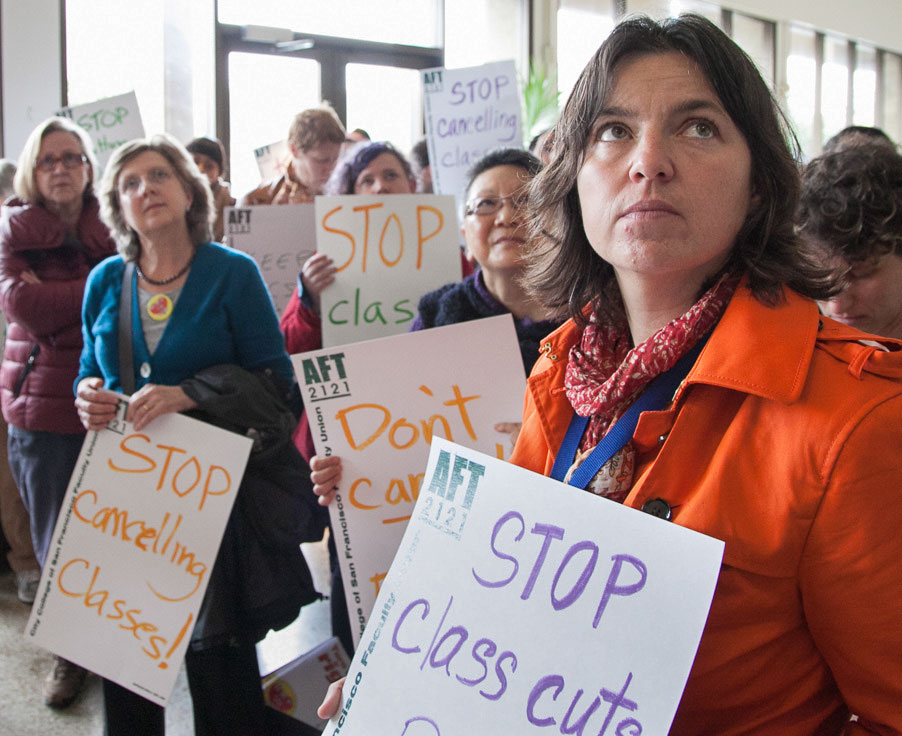Diversity Collaborative threatened by budget cuts

By Mary Strope
Special to The Guardsman
Following midterm cancellations of more than 100 classes, and in the wake of new proposals to reduce their numbers, department chairs in City College’s historic Diversity Collaborative underscored the importance of its rich and nuanced programs.
The collaborative encompasses African American studies, Asian and Asian American studies, Latin American and Latino/a studies, Philippine studies, women’s studies, and the first Gay, Lesbian, Bisexual and Transgender studies department in the country.
These departments, with histories stretching back to the civil rights era, grew out of marginalized people’s struggles, not gifts to the school from administrators, African American Studies Department Chair Tarik Farrar emphasized.
“The ethnic studies and multicultural departments are … the pathways that allow these students to engage,” Latin and Latin American Studies Department Chair Edgar Torres said.
Torres also serves as chair of the entire Diversity Collaborative.
Maggie Harrison, chair of women’s studies, noted that “a lot of students are animated and motivated” by a commitment to social justice nurtured by the program.
Students discovering a passion, then graduating to a university or career within the field, was a pattern noted repeatedly.
“Our students are coming out of (UC Berkeley), Stanford, Mills and SF State with high honors and going on to graduate school,” Ardel Thomas, director of LGBT studies, said. “The majority of these students are LGBT people of color.”
Thomas regularly receives calls about the curriculum and invitations to speak from across the world. Despite recognition from internationally renowned institutions like the University of Oxford, the program’s future remains in jeopardy.
Torres focused on students left behind as class sizes increase.
“The overall picture is that most of the students taking these courses have histories of not doing well academically,” Torres said.
Torres said the Latino/a and African American student’s social science grades fell farther this semester.
“We know there’s a very evident achievement gap,” Torres said. “Students of color underperform across the board.”
As Torres sat in his crowded office next to a sign that head “Cut Fees Not Classes,” students stopped by to seek advice about universities to which they’d been accepted.
“We’re looking at students who are at risk, probably before they were even at school,” Torres said. “Today, because of budget cuts, we’re asked to take on more and more students, so instructors pay less attention.”
Department chairs are worried the school will become a factory focused on churning out associate degrees. Meanwhile, budget cuts have already limited or eliminated testing and career development.
“Education is never a waste of resources,” Farrar said, comparing the estimated cost spent yearly on students at City College to the $50,000 spent on a prisoner in California.
Farrar pointed to a more general point lost in the budget issue—the importance of intellectualism, and the school’s responsibility to give their students a truly multi-faceted education.
He named earth sciences, astronomy and astrophysics classes as other small departments threatened by cuts.
An array of focused, academic courses makes the school desirable not only to students, but faculty as well, helping the school “attract high-quality instructors,” Harrison said.
Women in the Middle East, a new course offered this fall, is the type of class that UC Berkeley students are likely to attend.
The Women’s Studies program also houses Project SURVIVE, which trains students as peer educators, focusing on ending sexual violence and promoting healthy relationships.
Harrison cited Contemporary Women’s Writing as a small class threatened with cancellation that today is thriving and producing work on par with “upper level undergrads.”
She credits Dean of the School of English and Foreign Languages Jeffrey Lamb for deciding to let the class remain, and hopes deans will be mindful not just of numbers, but of a class’s individual impact.
While students hoping to take more basic courses may find other comparable units, classes in the diversity department may be harder to replicate.
“We need students to say, ‘This matters to me,’ and enroll in the class,” Harrison said.

Comments are closed.